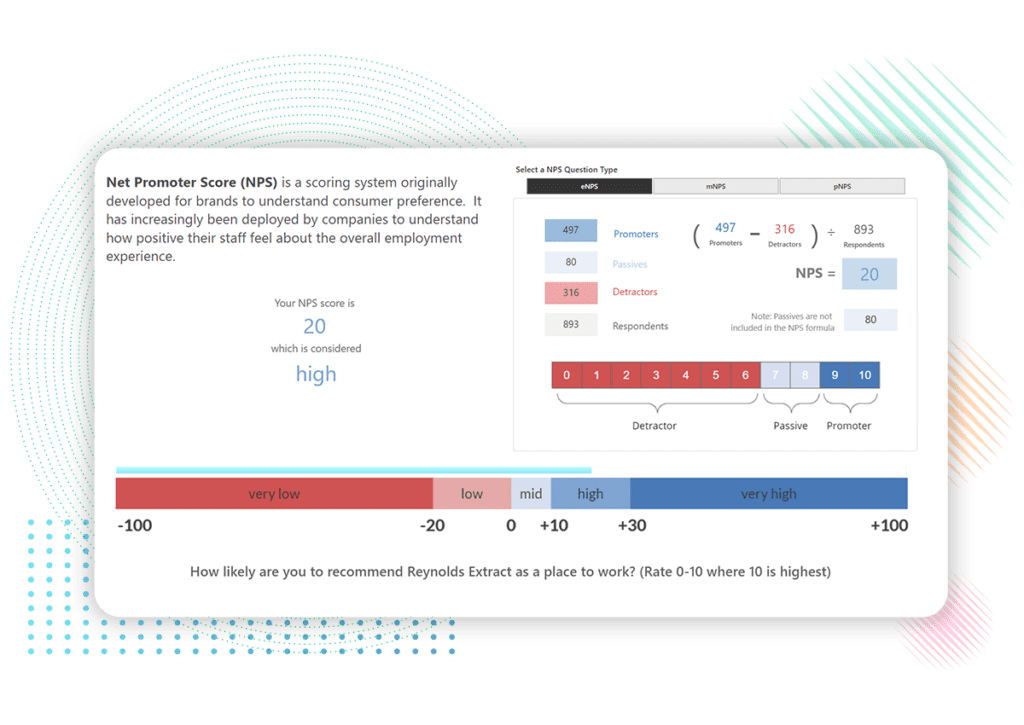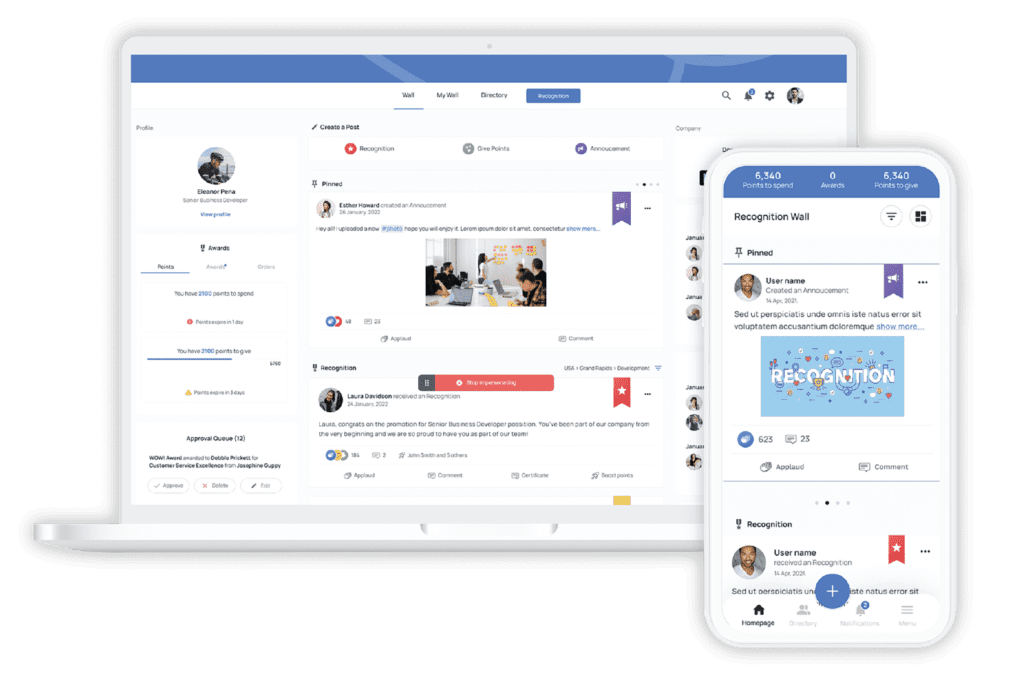May 7, 2025

Your business’s work culture is one of its most valuable assets. Get your culture right, and you’ll be positioned to tackle challenges, overcome hurdles, and seize opportunities with an outstanding company culture that fosters openness, collaboration, inclusivity, and recognition. Get it wrong, and even the most innovative products and services won’t save your company.
Below, we’ll walk you through everything you need to know about culture in the workplace, including why a strong culture is a competitive advantage today, how to perform your own culture audit, and steps you can start taking to improve it.
Introduction to Company Cultures
Company culture refers to the shared values, norms, and behaviors that define an organization and its work environment. A positive company culture is essential for driving business success, as it fosters employee engagement, retention, and satisfaction. In today’s competitive market, companies with strong cultures are more likely to attract and retain top talent, leading to improved business outcomes.
A healthy company culture is characterized by open communication, mutual respect, and a sense of belonging among team members. When employees feel valued and supported, they are more likely to be productive and committed to the company’s mission. Strong cultures create an environment where employees can thrive, innovate, and contribute to the organization’s success.
A key aspect of fostering such an environment is embracing what experts call a clan culture. This is a collaborative, people-focused work environment that emphasizes the importance of communication and value for each individual. Clan culture is characterized by action-orientation, adaptability to change, and the fostering of mentorship relationships while breaking down hierarchical barriers within the organization.
What Is Work Culture?
Some businesses make the mistake of thinking workplace culture is defined by ping-pong tables, office snacks, and flexible time off. While culture will define your company’s perks, your perks don’t necessarily define your company’s culture. Businesses with toxic cultures can still offer enticing benefits - sometimes even more so.
For example, a workplace culture focused on profitability doesn’t mind asking employees to work some weekends to finish the job. However, a workplace culture centered around work-life balance never lets the job interfere with or damage employees’ lives outside the office.
A market culture, on the other hand, is a results-oriented work environment that prioritizes external achievements over internal fulfillment, emphasizing metrics such as quotas and targets. This type of culture typically features a hierarchical separation between executives and employees, highlighting its focus on bottom-line performance.
Why is the Culture at Work Important
Aligning company culture with the organization's mission is crucial for fostering a positive work environment and enhancing employee engagement.
Here are a few reasons why workplace culture should be a top priority for your business:
- 67% of leaders and employees said culture is more important than strategy or operations.
- Disengaged employees are 8x more likely than engaged employees to leave a job for a better culture.
- A healthy work culture is 10 times more important to employees than pay.
- 66% of employees believe positive cultures impact their work for the better every day.
- Toxic company culture was cited as the top reason employees quit in 2022.
- 53% of employees say they experience culture through recognition and celebrations, and 69% would work harder if they received more recognition.
Work culture directly influences your employees’ performance, engagement, and happiness—and those all impact your bottom line. So what happens when you have a negative company culture?
Signs of a Toxic Company Culture
No one wants a toxic company culture, but knowing what a toxic culture looks like can be harder to pinpoint. First, let’s discuss what a toxic culture is.
Toxic company culture places a strong emphasis on efficiency, productivity, and “getting ahead.” At the same time, it minimizes the importance of rest, self-care, and work-life balance. Hierarchy culture, a traditional and risk-averse work environment, is characterized by a focus on stability, well-defined processes, and a clear chain of command. It often lacks adaptability and change, highlighting the structured separation between executives and employees.
Characteristics of a toxic culture often include:
- Employees feeling the need to come in early and/or work late
- Feeling pressure to not take their breaks or not take their full break
- An emphasis on hours worked
- Feeling reluctant to use PTO or sick days
- Answering calls, emails, IMs after hours and/or on weekends
- Feeling pressure to “keep up” and an inability to say no or set boundaries

Effects of Toxic Company Culture
At a glance, it may seem that toxic cultures aren’t all that bad. After all, it emphasizes efficiency and productivity – great qualities for any successful business.
But the problem with toxic cultures isn’t valuing these things. It’s valuing them above all else. It’s having work dominate employees’ lives and believing the more they do, the more valuable they are. It’s the inherent lack of balance between work and the things that make us human.
Instead of fostering a toxic environment, companies should push employees through honest feedback and a supportive environment. This approach can foster innovation and continuous improvement by empowering employees to think independently and take risks, which is essential for cultivating an entrepreneurial spirit within the organization.
And this lack of balance naturally lays the groundwork for stress, disengagement, and burnout. In fact, an analysis from Deloitte found that 77% of American workers have experienced burnout at their current job.
Furthermore, a 2021 survey published by the ADP Research Institute found that 1 in 10 employees surveyed across 17 countries have been putting in more than 20 hours of free work per week – a common issue with the rise of remote work and blurred boundaries between work and personal life.
And what happens when employees become stressed, disengaged, and burned out? They quit. Especially millennials (people roughly 27 to 42). Deloitte’s study found that nearly half of millennials say they have left a job specifically because they felt burned out.
How a Great Company Culture is a Competitive Advantage
Now that we know the effects of a toxic culture, what does it mean to have a truly healthy company culture? Here, we’ll take a look at how a great culture fosters a positive work environment by enhancing communication, collaboration, and commitment among team members. A strong company culture is not only good to have but also a competitive advantage in today’s environment.

Improved Employee Retention and Engagement
It’s likely no surprise that strong company culture is linked to lower employee turnover and higher engagement. The problem is that most companies are missing the mark. Research from Gallup found that 2 in 10 employees feel meaningfully connected to their company’s culture. Furthermore, only 27% strongly agree that they believe in their organization's values.
So, it should be unsurprising that employee engagement in 2022 declined to a mere 32% – down from 36% in 2020 and 34% in 2021. And employee disengagement is on the rise, with 18% of employees now reporting being actively disengaged.
While there are many factors that go into employees disengaging, feeling disconnected from the company’s purpose is one that leaders have the power to influence.
In fact, a study from McKinsey & Company found that 82% of employees believe it’s important their company has a purpose; ideally, one that contributes to society and creates meaningful work.
And when a company has purpose, its people do, too. Another study from McKinsey found that 70% of employees say their personal sense of purpose is defined by their work, and when that work feels meaningful, they perform better, are much more committed, and are about half as likely to go looking for a new job.
So, finding ways to connect what your employees do and care about to the company’s culture and values will not only benefit your employees, it’ll benefit your company too.
Better Business Outcomes
An engaged team who’s connected to their company’s mission is a team that delivers. According to Gallup, engaged employees make it a point to show up to work and do more while they’re there.
So much so, companies with highly engaged teams realize an 81% difference in absenteeism and a 14% increase in productivity. Engaged teams are also linked to a 10% increase in client ratings and an 18% increase in sales.
A strong company culture fosters employee engagement, attracts top talent, and ultimately drives an organization's success, highlighting the essential role that a positive workplace culture plays in achieving long-term organizational goals.
All this to say, companies with engaged teams who feel connected to their organization’s mission see higher profitability and better business outcomes overall – a clear competitive advantage for any company.
Attract Talent, Smoother Recruitment
It’s inevitable for every company to experience some turnover. And when these employees leave, they’ll tell people about their experience at your company, either first-hand or through websites like Glassdoor. This is how companies either get reputations for being a great place to work or for being somewhere to avoid.
It’s also true that top talent will have their pick of offers when job hunting. Chances are, they won’t risk taking the job at the company with the reputation of a toxic culture.
Furthermore, having a strong company culture can help guide the recruitment process. You’ll be able to identify which individuals will bring a fresh perspective to your culture. So much so, some companies require applicants to complete a culture index questionnaire before interviewing.
Onboarding strategies for new employees are crucial. A structured process significantly enhances their integration and job satisfaction, ensuring they feel connected and engaged from their first days.
Being able to attract top talent and have them acclimate quickly means less time spent candidate hunting and a shorter training period.
6 Steps to Perform Your Own Culture Audit
Ready to start improving the culture at your company? Continuous efforts in improving company culture are essential for maintaining a positive work environment and overall progress. Get started with our 6-step culture audit.
1. Survey Your Team
Whether you think your company culture is healthy or not, it’s important to start on the right foot. So, consider giving employee surveys to gain a deeper understanding of your current environment.
According to the Harvard Business Review, employee surveys are essential diagnostic tools for identifying the root causes of toxic workplace environments. They can uncover specific problems that hinder the development of a positive company culture.
You may think you know what areas your company needs to prioritize, but you may find your employees are having a different experience altogether. For example, you may think your employees are handling their workloads easily, but your survey reveals a significant number of your staff are struggling with stress and burnout.
In this case, managers can begin to be proactive and use this information to address workload with their employees in one-on-one check-ins.

2. Choose Your Words
Ask top executives and employees alike to choose a few words to describe your current company culture as well as their ideal company culture.
From here, you’ll likely notice trends forming, whether it’s some words coming up consistently or no commonality between leaders and employees. Either way, you’ll gain valuable insight into your current culture.
3. Evaluate the Results
If you find trends, either in the words chosen or feedback given, that don’t align with the culture you’d like, you’ll want to take a deeper look at why that is.
For example, you might want a diverse culture based on innovation and trust, but your employees feel that the culture is rigid, stagnant, and based on micromanagement. In this case, further research should be done to uncover where this disconnect is coming from.
Are you inadvertently hiring the same kinds of people? Do you reprimand people for making mistakes (discouraging risk and innovation)? These will be questions only your team can answer.
4. Write It Down
Once you determine the words that you’d like to describe your culture, write them down. Make it concrete and legitimate by communicating your culture goals to employees. And publish your culture and values on your website, employee resources, and office walls as a reminder to live the words you chose.
Also, consider implementing a recognition platform that ties employee recognition to company values.
And if you make changes to your culture, publicize the changes, and explain the reasoning. For example, you might have a culture of closeness and collaboration—if you switch to a remote work policy, explain how this will impact your culture and what you'll do to keep it alive.
5. Walk the Walk
It’s important to recognize the role leadership plays in cultivating the culture that actually develops in an organization, so be sure to hold them accountable.
For example, employees typically don’t prefer to work through lunch or send emails late at night. So, if this is happening at your company, consider why. Do you expect employees to work late or through lunch to meet deadlines? Are their workloads excessive? Are they simply following the example set by their leader?
These types of unspoken (or spoken) expectations can breed a toxic culture. To combat this, it’s typically not enough to only reiterate taking breaks and signing off at 5pm – although you should do so. Oftentimes, employees end up feeling like it’s not worth taking breaks because it will only set them back and cause more work later.
Instead, have an open conversation with your employees. Take a look at their workloads. Try to understand the root cause of their burn out. Then, work towards making changes that will help alleviate causes of stress. This will show your employees that you’re committed to making real change and it’s not just talk.
6. Measure Your Efforts
Lastly, follow up. Use feedback platforms and regular surveys to understand how the culture of your business is evolving. Compare your efforts to previous surveys and adjust your efforts accordingly.

How to Build a Better Culture at Work: 6 Tips
Conducting a culture audit is the best way to understand your company’s unique environment. However, there are still things every company can do to improve their culture - after all, a healthy culture is essential in fostering employee engagement and trust, which can significantly reduce burnout and improve overall productivity.
Creating an inclusive environment is crucial to enhancing the overall employee experience, which in turn boosts employee satisfaction and engagement.
Here, we’ll dive into a few strategies every company’s culture would benefit from implementing.
1. Prioritize Mental Health
With burnout so prominent today, prioritizing employees’ mental wellbeing is crucial. But remember, company culture is determined from the top down, so be sure you have a healthy work/life balance and encourage others to do the same.
Remind your employees to unplug at the end of the day and don’t send emails after hours. Be careful about who you promote as well. If chronic over-workers are the ones who are “getting ahead,” think about the message that sends to other employees.
Also encourage employees to use their PTO - and consider offering more of it. According to Indeed, 36% of all workers say more PTO could help reduce their burnout. Two weeks may be standard, but what if you offered three? What if every month had at least one three-day weekend? What about giving more PTO around the holidays?
Remember though, time off isn’t the cure to burnout, it’s an additional support. Organization psychologist Adam Grant says, “The holidays shouldn’t be a time to recharge. They should be a time to celebrate. If work is exhausting people to the point that they’re using their time off to recover, you might have a burnout culture. A healthy organization doesn’t leave people drained in the first place.”
Furthermore, consider allowing mental health days, starting a wellness program, and offering free counseling through an Employee Assistance Program. Talking about how you care about mental wellness is good, but implementing processes to help support mental wellness is what matters most.
2. Invest in DEI
DEI (or diversity, equity, and inclusion) is a framework that strives for more fairness and empowerment for individuals who have typically been underrepresented or subject to discrimination in the workplace.
Research has also found:
- Companies with executive teams with more gender diversity were 25% more likely to have above-average profitability than companies with less gender diversity.
- The most gender diverse companies were 48% more likely to outperform the least gender diverse companies.
- Companies with racial and ethnic diversity are 36% more likely to outperform their peers.
- People who felt their company wasn’t doing enough for diversity reported lower scores in all areas of job satisfaction - particularly in areas of pay and career advancement.
- 78% of people feel that it’s important for them to work for an organization that prioritizes diversity and inclusion, with 58% saying it’s “very important.”
- Companies with inclusive cultures have 22% lower turnover rates.
- Millennials are 83% more engaged when working in an inclusive culture.
Furthermore, prioritizing DEI can help bring company values to life. If your organization has any kind of corporate value around community, belonging, inclusion, collaboration, etc. DEI efforts will likely be needed to truly uphold those values.
Get started by implementing DEI training, creating employee resource groups, and celebrating a wide variety of holidays and traditions at work.
3. Encourage Open Communication and Transparency
A healthy company culture is based on trust – and trust is based on transparency. When employees feel that they’re out of the loop, it lays the groundwork for insecurities and disengagement.
Avoid these insecurities by addressing (appropriate) business decisions publicly. During company meetings, talk about the direction the company is moving in, goals that were achieved and upcoming targets.
And don’t be afraid to talk about difficulties – chances are, your employees will notice any issues in the company and be talking about them amongst themselves anyway. Addressing it directly allows you to control the narrative while instilling trust.
Encourage your employees to share feedback either openly or through an anonymous survey program, as well. Many employees have great suggestions for improving culture and employee engagement but can sometimes feel unsure about sharing ideas openly. Providing a safe space for employees to voice their thoughts can help people feel heard.
Additionally, consider adopting 360 feedback for your review process. Traditionally, evaluations are given to an employee from their supervisor in a “top-down” approach. With 360 feedback, the employee will be able to evaluate their supervisor as well.
The employee will also be reviewed by more than just their supervisor. This helps give each person a more rounded, objective, honest review.
4. Build Trust, Be Flexible
Flexibility at work can mean all kinds of things. It could be letting employees start work later in the morning and finish later in the evening. It can be offering remote or hybrid options. It can be embracing mistakes as a learning opportunity when they inevitably happen.
But at the root of a flexible workplace is trust. How organizations treat their employees' work is crucial in shaping company culture. Flexibility at work embraces the idea that employees can be productive no matter when or where they perform their work. Rather than enforcing a rigid workplace environment or schedule, workplace flexibility puts trust in the employee and empowers them to do their work in a way that’s best for them.
In many overworked, toxic culture environments, employees feel the need to prove their work. They may feel the need to partake in performative acts, like telling coworkers how late they worked or how little they slept.
A flexible workplace that’s based on employee trust is the antidote to the pressure of a toxic company culture.
5. Make Employee Recognition Your Foundation
Employee recognition is arguably the simplest thing companies can do to improve not only their work culture, but drive retention and engagement as well.
In fact, research shows that:
- 82% of people are happier when they’re recognized at work. (Curiosity at Work)
- 85% of HR professionals say employee recognition programs positively affect organizational culture. (Mercer)
- When employees believe they’ll be recognized for their work, they’re 7 times more likely to be highly engaged. (Quantum Workplace)
- 63% of employees who feel recognized are unlikely to look for a new job. (Curiosity at Work)
- Companies with effective employee recognition programs have 31% lower voluntary turnover. (Forbes)
Mentorship programs are also crucial in providing growth opportunities, which can significantly enhance employee engagement and retention.
So, how can leaders create a culture of recognition at their organization? Here are a few simple and effective ways.
Publicly recognize employees:
Consider adding in a moment to team and/or company meetings to give individuals public recognition or a shout out for a job well done. It’s a simple gesture that carries significant weight.
That’s because when an employee’s hard work is acknowledged and appreciated, it creates a dopamine surge in the brain. Dopamine is powerful and motivating, and reinforces the behavior.
Fostering strong relationships among employees through effective leadership and a supportive environment can further enhance engagement and collaboration.
One study even found that receiving a compliment, like genuine recognition, is just as thrilling to the brain as receiving cash— both are perceived by the brain as “social rewards.”
Giving employees a monetary bonus:
While monetary recognition can be effective, it’s also impersonal. So, it’s important to remember that it’s not the only way to show appreciation. In fact, money should never be the only form of recognition you give your employees.
A strong company culture, emphasizing shared values and positive employee interactions, is crucial for achieving overall company success. Too much focus on monetary rewards can also create a toxic environment, which is often counter-productive. It’s important to find a balance that works for your company culture.
Implementing a social recognition platform:
If you have an employee recognition budget in place, consider investing in a recognition program. There are all kinds of programs available to help build recognition into your company’s culture.
Evaluating company culture within an organization is crucial for promoting transparency and forming culture committees that enhance communication and employee engagement.
Terryberry’s social recognition platform offers a comprehensive solution that can host your recognition efforts, including milestone and service awards, peer-to-peer social recognition, feedback and surveys, and performance and incentive rewards.
This platform even allows for analytics that show in real-time key performance indicators so you can be sure your program is effective. This is a great way to help in creating a culture of recognition by empowering employees (as well as leaders) to recognize each other.
6. Be Conscious of Perks and Amenities
While perks and amenities can’t fix a broken culture, they can play a big part in defining and expanding your culture. For example, if you want work-life balance to be a primary tenant of your culture, you’d likely want to implement remote work policies and flexible work schedules.
Creating a good company culture is essential for fostering a positive work environment that values employee well-being and encourages innovation.
Think of what perks and benefits you could offer your staff to align with your culture. It could be anything from employee wellness programs to employee stock purchasing plans. Providing professional development opportunities, such as leadership training, education stipends, and new project responsibilities, could also be seen as a perk.
Just be wary of mistaking perks alone for culture. A ping pong table and nap pods won’t be an antidote for a culture that drives employees to burn out. Instead, perks and amenities should act as a support to your culture and values.
Improve Company Culture and Employee Engagement with Terryberry
Terryberry provides the solutions you need to better recognize employees and build the work culture that keeps employees engaged:
- Service Awards and Performance Awards: Recognize and reward employees based on years of service awards, anniversaries, or performance.
- Social Recognition: Empower your employees and managers to recognize their peers and celebrate successes with an easy-to-use social recognition application.
- Feedback and Communication: Unlock improved feedback and communications with employee and customer feedback solutions.
A positive company culture can significantly boost employee engagement, leading to increased enthusiasm and commitment to their work.
Ready to learn more? Schedule a demo with our team to get a hands-on walkthrough of how Terryberry can transform the culture of your workplace.

